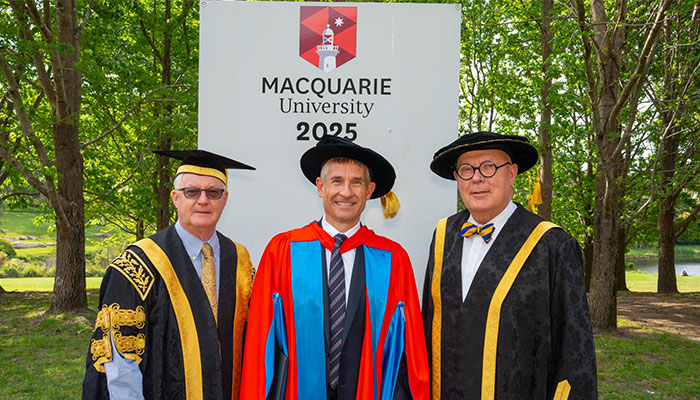Forty-three current and recently graduated Macquarie University students will be asked to attend Disciplinary Committee hearings in coming weeks to explain how their names were among files held by the MyMaster website*.
The referrals to the Disciplinary Committee, in line with the University’s established procedures for dealing with matters of academic dishonesty, follow the completion of an independent investigation commissioned by Macquarie.
Deputy Vice-Chancellor (Academic) Professor John Simons, said Macquarie University took matters of academic misconduct extremely seriously and would leave no stone unturned in establishing whether or not cheating had occurred.
“Our investigator’s report identifies 43 current and former students who are mentioned by name in the MyMaster files provided to us by Fairfax,” he said. “Some of these students may be completely innocently mentioned - this is for the disciplinary process to uncover.
“But if it is established that students have knowingly submitted as their own academic work, essays and assignments purchased from the site, then that would be a clear breach of both the University’s Academic Honesty Policy and its Student Code of Conduct.”
Penalties imposed by the University Discipline Committee in relation to academic misconduct may include one or more of the following:
“We believe only a tiny percentage of our 40,000 current students are involved in cheating, but they have a disproportionate effect on our worldwide reputation for academic integrity,” Professor Simons added. “It is therefore extremely important that we stamp out academic dishonesty whenever it occurs.”
*Note: Proprietor of the MyMaster website, Yingying Dou, has been incorrectly referred to in the media as a graduate of Macquarie University. This is incorrect. She studied at Macquarie University in 2006/7, but did not graduate.
Macquarie University is committed to maintaining the Australian higher education system’s worldwide reputation for the highest standards of academic integrity.
All serious cases of academic misconduct at Macquarie are referred to a central University Discipline Committee. At their meetings, the Committee members – including representatives of the University’s Council and Executive – review documentation provided and allow students the opportunity to respond to the alleged misconduct and answer questions. The Committee then determines if a breach of the University’s Academic Honesty Policy is proven, and if so, what penalty is appropriate.
Students who have purchased fraudulent assessments have been brought before the University Disciplinary Committee, proving that this method of cheating is detectable.
Believing that it is better to prevent instances of academic dishonesty if possible, Macquarie not only seeks to dissuade students from cheating through education campaigns, but also actively works to prevent advertising of sites similar to MyMaster on campus. Security Services routinely inspect areas where notices are posted and remove material that they believe advertises services providing fraudulent assessments. These are investigated by the University and in some cases are able to be exposed and shut down. Other proactive measures include:
The management of Final Examinations includes validation of student identity; confirming an individual’s identity with the University Campus Card when attending examinations. Examination supervisors are provided with training in detecting cheating and there is improved engagement with students prior to the commencement of a Final Examination to ensure that students are aware of the serious nature of exam misconduct and the penalties it carries.
There is an ongoing program of review and modification to the design of the assessment regime across the University, particularly around examinations, which is ‘designing out’ many opportunities for cheating. This includes changes to examinations to prevent cheating; limiting the academic weighting of examinations and assessments to reduce the risk of a student passing a unit with fraudulent submissions; including a question in the Final Examination about the assignment, or including a presentation on the assignment as part of a unit’s assessment. A number of assessment tasks are invigilated to mitigate opportunities for cheating in assignments.
Online assessment through TurnItIn is almost universal. This is an effective mechanism to identify plagiarism and copying, particularly for students resubmitting work from previous Macquarie students, which remains the most likely form of plagiarism, accidental or otherwise.
The referrals to the Disciplinary Committee, in line with the University’s established procedures for dealing with matters of academic dishonesty, follow the completion of an independent investigation commissioned by Macquarie.
Deputy Vice-Chancellor (Academic) Professor John Simons, said Macquarie University took matters of academic misconduct extremely seriously and would leave no stone unturned in establishing whether or not cheating had occurred.
“Our investigator’s report identifies 43 current and former students who are mentioned by name in the MyMaster files provided to us by Fairfax,” he said. “Some of these students may be completely innocently mentioned - this is for the disciplinary process to uncover.
“But if it is established that students have knowingly submitted as their own academic work, essays and assignments purchased from the site, then that would be a clear breach of both the University’s Academic Honesty Policy and its Student Code of Conduct.”
Penalties imposed by the University Discipline Committee in relation to academic misconduct may include one or more of the following:
- applying a fail grade for an examination, assessment task or unit of study;
- suspension or exclusion from studies; and
- issuing a reprimand and/or applying a period of disciplinary probation.
“We believe only a tiny percentage of our 40,000 current students are involved in cheating, but they have a disproportionate effect on our worldwide reputation for academic integrity,” Professor Simons added. “It is therefore extremely important that we stamp out academic dishonesty whenever it occurs.”
*Note: Proprietor of the MyMaster website, Yingying Dou, has been incorrectly referred to in the media as a graduate of Macquarie University. This is incorrect. She studied at Macquarie University in 2006/7, but did not graduate.
How Macquarie University is addressing the global issue of academic dishonesty
Macquarie University is committed to maintaining the Australian higher education system’s worldwide reputation for the highest standards of academic integrity.
All serious cases of academic misconduct at Macquarie are referred to a central University Discipline Committee. At their meetings, the Committee members – including representatives of the University’s Council and Executive – review documentation provided and allow students the opportunity to respond to the alleged misconduct and answer questions. The Committee then determines if a breach of the University’s Academic Honesty Policy is proven, and if so, what penalty is appropriate.
Students who have purchased fraudulent assessments have been brought before the University Disciplinary Committee, proving that this method of cheating is detectable.
Believing that it is better to prevent instances of academic dishonesty if possible, Macquarie not only seeks to dissuade students from cheating through education campaigns, but also actively works to prevent advertising of sites similar to MyMaster on campus. Security Services routinely inspect areas where notices are posted and remove material that they believe advertises services providing fraudulent assessments. These are investigated by the University and in some cases are able to be exposed and shut down. Other proactive measures include:
- Improved management of final examinations
The management of Final Examinations includes validation of student identity; confirming an individual’s identity with the University Campus Card when attending examinations. Examination supervisors are provided with training in detecting cheating and there is improved engagement with students prior to the commencement of a Final Examination to ensure that students are aware of the serious nature of exam misconduct and the penalties it carries.
- Modifying assessment design: ‘Designing out’ cheating
There is an ongoing program of review and modification to the design of the assessment regime across the University, particularly around examinations, which is ‘designing out’ many opportunities for cheating. This includes changes to examinations to prevent cheating; limiting the academic weighting of examinations and assessments to reduce the risk of a student passing a unit with fraudulent submissions; including a question in the Final Examination about the assignment, or including a presentation on the assignment as part of a unit’s assessment. A number of assessment tasks are invigilated to mitigate opportunities for cheating in assignments.
- Increased use of online tools to detect cheating
Online assessment through TurnItIn is almost universal. This is an effective mechanism to identify plagiarism and copying, particularly for students resubmitting work from previous Macquarie students, which remains the most likely form of plagiarism, accidental or otherwise.



